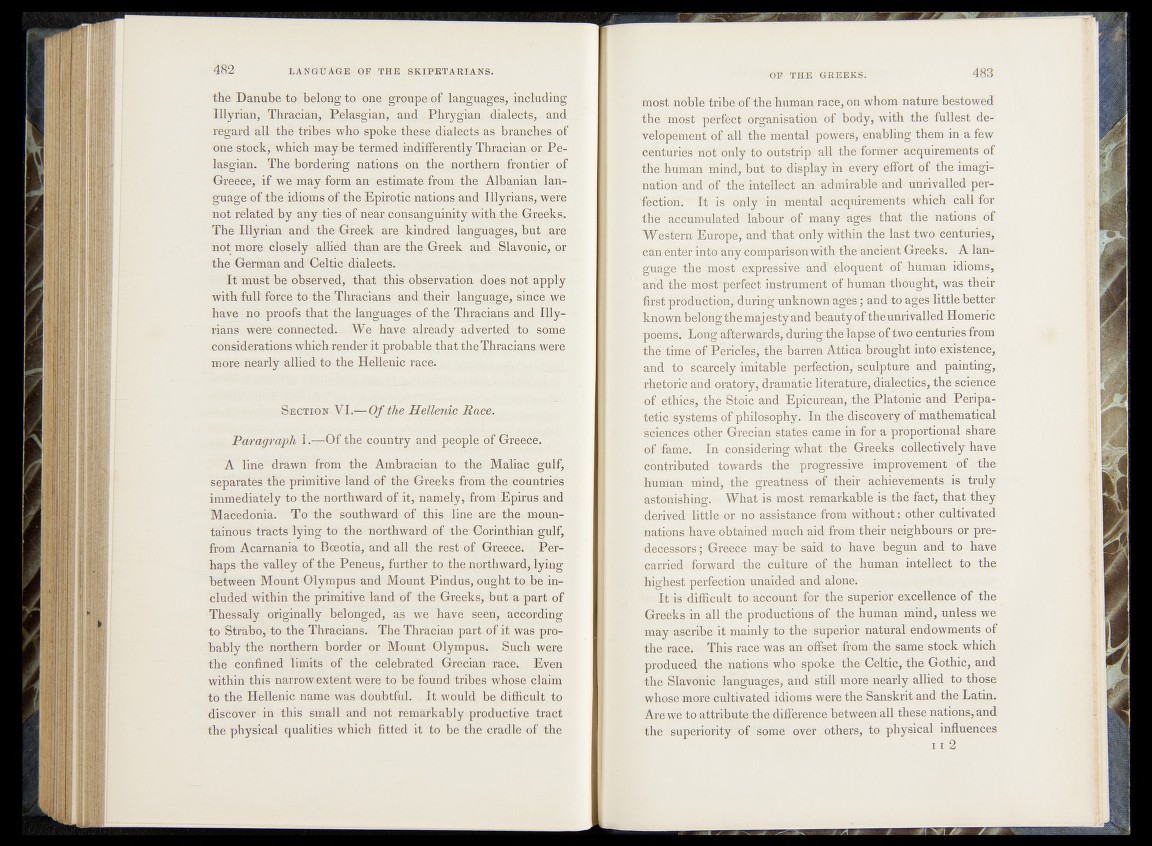
the Danube to belong to one groupe offi-languages, including
Illyrian, Thracian, Pelasgian, and Phrygian,,dialects, and
regard all the tribes who spoke these dialects as branches of
one stocky which may be termed indifferently Thracian or Pelasgian.
The bordering nations- on the northern frontier ,of
Greece, if we may form an estimate from the Albanian language
of the idioms of the Epirotic nations and Illyrians, were
not related by any ties of near consanguinity with the; Greeks.
The Illyrian and the Greek are kindred languages, but .are
not more closely allied than are the Greek and Slavonic, or
the German and 'Celtic dialects.
It must be observed, that this observation does not apply
with foil force to the Thracians and their language, since,uwe
have no proofs that the languages of the Thracians...and IllyT
rians were eoHnecte^t- We have* already- adv^|e(^'to,^a|(|ne
considerations which render it probable that the Thracians.>weiie
more nearly allied to the Hellenic race.
Section V I.— O f the HellemcxRace. ,
Paragraph l.-^fGf the country and people^qCGreepe,/ ƒ
A line drawn from the Ambracian to Hhe Maliac gulf)
separates the primitive land of the Greeks from thefc#untries
immediately to the northward of it, namely plrom - Epirus and
Macedonia. To the southward of this line^are the mountainous
tracts lying to the northward of the. Gorinthian gulf,
from Acamania to Bceotia, and all the rest of Greece; Perhaps
the valley of the Peneus, further to the northward, lying
between Mount Olympus and Mount Pindus, ought to be included
within the primitive land of the Greeksybufc a part of
Thessaly originally belonged, a§. we have seen, according
to Strabo, to the Thracians. The Thracian part of it was probably
the northern border or Mount Olympus. Such were
the confined limits of the celebrated Grecian race. Even
within this narrow extent were to be found tribes whose claim
t6 the Hellenic name was doubtful. It would, be difficult to
discover; in this small and not remarkably productive tract
the physical qualities* which fitted it to be the cradle of the
most noble tribe of the human race, on whom nature bestowed
the most perfect Organisation of body, with the fullest de-
%eleTpem‘ent of all Ihe mental powers, enabling them in a few
centuries not only td outstrip all the former acquirements of
the human mind; but to display in every effort of the imagination
and of the intellect an> admirable and unrivalled perfection.
It is %nly in mental acquirements which call for
the' accumulated labour o f many ages'-that the nations of
Western Europe, and that only within the last two centuries,
can enter irifd* anybdmparison with the ancient Greeks; A language
: the* 'most expressive',and’ feloipient of human idioms,
and the mdsripetfect instrument Of human thought, was their
first^’roduction, during unknownhges; and to ages-little better
knowp belong the majesty atid~ beauty of the unrivalled Homeric
poems. Long afterwards,'.during the'fapsef6f-two centuries from
the time of Peri^le^the barren Attica brought into-existence,
and to~scarcely imitab'l#^p^f^ction,iseulpture and painting,
Iriietorib and oratory, dramatic literature, dialectics, the science
f o i ethics,,tfed*-Stoic and Epicurean, the Platonic and Peripa-
‘ tefic’^system#of philosophy. In the discovery of mathematical
~ Other Grecian states came in for a proportional share
yOf"-fame. In cohsid’efm'g.yhat the* Greeks collectively hav©
-contributed towards -thop'progressive improvement of - the
human mind, the greatness, of their achievements is truly
«astonishing.« What is most remarkable is.the fact, that they
derived littleAOO'no assistanemfrom without: other cultivated
nations ,have obtained much aid from their neighbours or predecessors';
-Greece maybe: said to shaves , begun and to have
carried forward the «culture of the human intellect to the
highest, perfection unaided and alone.; „
^ Tt^ difficu lt to accounfcffor'f'the superior excellence o f the
Greeks in alkthetproductions of the human mind, unless we
may ascribh it mainly to the superior natural endowments of
the race. This race was an offset from the same stock which
produced the nations who spoke the Celtic, the Gothic, and
the Slavonic languages, and stiff more nearly allied to those
whose more cultivated idioms were the Sanskrit and the Latin.-
Are we to attribute the difference between all these nations, and
the superiority of ; Some« over others, to physical influences
11 2
riFiii iiTiiiBwrr £ f